List of Native American Medal of Honor recipients
This is a list of Native Americans awarded the nation's highest military decoration — the Medal of Honor. The Medal of Honor is bestowed "for conspicuous gallantry and intrepidity at the risk of life, above and beyond the call of duty, in actual combat against an armed enemy force." The medal is awarded by the President of the United States on behalf of the Congress.
| Medal of Honor |
|---|
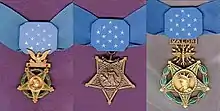 |
| All recipients |
| American Civil War |
|
| Other wars and conflicts |
|
|
| By ethnic group |
| By other criteria |
Of the 3,469 Medals of Honor awarded as of 2010, 29 have been awarded to Native Americans.
The Medal of Honor was created during the American Civil War and is the highest military decoration presented by the United States government to a member of its armed forces. The recipient must have distinguished themselves at the risk of their own life above and beyond the call of duty in action against an enemy of the United States. Due to the nature of this medal, it is commonly presented posthumously.[1]
List of recipients
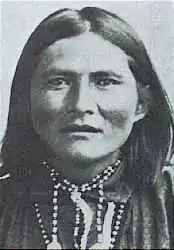 William Alchesay
William Alchesay Elsatsoosu
Elsatsoosu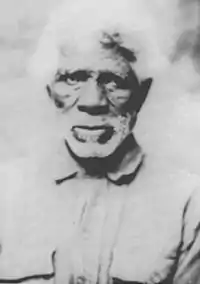 Pompey Factor
Pompey Factor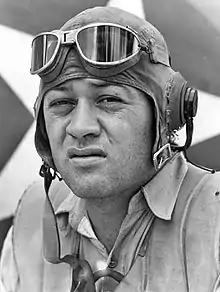 Gregory "Pappy" Boyington
Gregory "Pappy" Boyington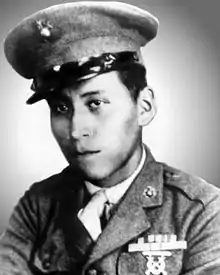 Mitchell Red Cloud
Mitchell Red Cloud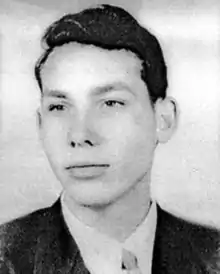 Tony Burris
Tony Burris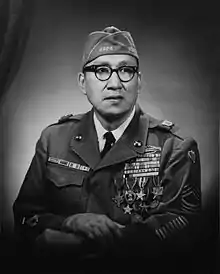 Woodrow Keeble
Woodrow Keeble
| Name | Tribe/Nation | Service | Rank | Conflict | Place of action | Date of action | Notes |
|---|---|---|---|---|---|---|---|
| Co-Rux-Te-Chod-Ish | Pawnee | Army | Sergeant | Indian Wars | Republican River, Kansas | July 8, 1869 | "Ran out from the command in pursuit of a dismounted Indian; was shot down and badly wounded by a bullet from his own command" |
| Chiquito | White Mountain Apache | Army | Scout | Indian Wars | Arizona Territory | Winter of 1871–1873 | For his "conduct during campaigns and engagements with Apaches" |
| Jim | White Mountain Apache | Army | Sergeant | Indian Wars | — |
Winter of 1871–1873 | For his "conduct during campaigns and engagements with Apaches" |
| Machol | Apache | Army | Private | Indian Wars | Arizona Territory | 1872–1873 | For his "conduct during campaigns and engagements with Apaches" |
| Nannasaddie | White Mountain Apache | Army | Scout | Indian Wars | Arizona Territory | 1872–1873 | For his "conduct during campaigns and engagements with Apaches" |
| Nantaje | White Mountain Apache | Army | Scout | Indian Wars | Arizona Territory | 1872–1873 | For his "conduct during campaigns and engagements with Apaches" |
| William Alchesay | White Mountain Apache | Army | Sergeant | Indian Wars | Arizona Territory | Winter of 1872–1873 | For his "conduct during campaigns and engagements with Apaches" |
| Blanquet | Apache | Army | Scout | Indian Wars | Arizona Territory | Winter of 1872–1873 | For his "conduct during campaigns and engagements with Apaches" |
| Elsatsoosu | Apache | Army | Corporal | Indian Wars | Arizona Territory | Winter of 1872–1873 | For his "conduct during campaigns and engagements with Apaches" |
| Kelsay | White Mountain Apache | Army | Scout | Indian Wars | Arizona Territory | Winter of 1872–1873 | For his "conduct during campaigns and engagements with Apaches" |
| Kosoha | White Mountain Apache | Army | Scout | Indian Wars | Arizona Territory | Winter of 1872–1873 | For his "conduct during campaigns and engagements with Apaches" |
| Adam Paine | Black Seminole | Army | Private | Indian Wars | Canyon Blanco tributary of the Red River, Texas | September 26, 1874 – September 27, 1874 | "Rendered invaluable service to Col. R. S. Mackenzie, 4th U.S. Cavalry, during this engagement" |
| Pompey Factor | Black Seminole | Army | Private | Indian Wars | Pecos River, Texas | April 25, 1875 | With three others, charged a numerically superior force |
| Isaac Payne | Black Seminole | Army | Trumpeter | Indian Wars | Pecos River, Texas | April 25, 1875 | With three others, charged a numerically superior force |
| John Ward | Black Seminole | Army | Sergeant | Indian Wars | Pecos River, Texas | April 25, 1875 | With three others, charged a numerically superior force |
| Rowdy | Apache | Army | Sergeant | Indian Wars | Arizona Territory | March 7, 1890 | |
| Pappy Boyington | Sioux | Marine Corps | Major | World War II | Central Solomons area, Pacific Ocean | September 12, 1943 – January 3, 1944 | Led his squadron in a series of missions against superior numbers |
| Ernest Childers | Muscogee[2] | Army | Second Lieutenant | World War II | Oliveto, Italy | September 22, 1943 | Although injured, killed two snipers and attacked two machine gun nests |
| Jack C. Montgomery | Cherokee[2] | Army | First Lieutenant | World War II | near Padiglione, Italy | February 22, 1944 | Single-handedly attacked two German positions and took dozens of prisoners |
| Van T. Barfoot | Choctaw[2] | Army | Technical Sergeant | World War II | near Carano, Italy | May 23, 1944 | Single-handedly destroyed two machine gun nests, took prisoners, and disabled a tank |
| Roy W. Harmon* | Army | Sergeant | World War II | near Casaglia, Italy | July 12, 1944 | Single-handedly attacked three German positions although wounded | |
| Ernest E. Evans* | Cherokee/Muscogee[3] | Navy | Commander | World War II | off Samar, Philippines | October 25, 1944 | In battle off Samar, where a major portion of the Japanese Battle fleet surprised the Taffy 3 escort carrier task unit, Evans immediately attacked with his single destroyer, the Johnston, against overwhelming odds. At the cost of his own life, his ship, and much of his crew, they helped to inflict the amazing defeat on the enemy battleships and cruisers by a far inferior American force. |
| John N. Reese, Jr.* | Army | Private First Class | World War II | Paco Railroad Station, Manila, Philippines | February 9, 1945 | With another soldier, attacked a Japanese-held railroad station | |
| Mitchell Red Cloud, Jr.* | Ho-Chunk[2] | Army | Corporal | Korean War | near Chonghyon, Korea | November 5, 1950 | Maintained an exposed position, continued to fight after being wounded |
| Raymond Harvey | Chickasaw[4] | Army | Captain | Korean War | near Taemi-Dong, Korea | March 9, 1951 | Led his men against a series of emplacements, continued to lead after being wounded |
| Tony K. Burris* | Choctaw[5] | Army | Sergeant First Class | Korean War | near Mundung-ni, Korea | October 8, 1951 – October 9, 1951 | Single-handedly attacked two positions although wounded, killed while attacking a third |
| Woodrow W. Keeble* | Sioux[6] | Army | Master Sergeant | Korean War | near Sangsan-ni, Korea | October 20, 1951 | Single-handedly attacked three machine gun nests |
| Charles George* | Cherokee[2] | Army | Private First Class | Korean War | near Songnae-dong, Korea | November 30, 1952 | Smothered the blast of a grenade with his body |
| James E. Williams | Cherokee | Navy | Boatswain's Mate 1st Class | Vietnam War | Mekong River, South Vietnam | October 31, 1966 | Destroyed 65 boats and over 1,000 enemy |
| Michael E. Thornton | Cherokee[2] | Navy | Petty Officer 2nd Class | Vietnam War | South Vietnam | October 31, 1972 | Through a hail of fire he succeeded in removing his seriously wounded superior officer then towed him two hours in the water until being rescued |
References
- "A Brief History — The Medal of Honor". Frequently Asked Questions (FAQ). Department of Defense. August 8, 2006. Archived from the original on June 15, 2009. Retrieved February 9, 2010.
- "Native American Medal of Honor Winners". Naval History & Heritage Command. June 13, 2005. Archived from the original on July 3, 1998. Retrieved September 26, 2009.
- Thomas, Evan (2006). Sea of Thunder: Four Commanders and the Last Great Naval Campaign, 1941–1945. New York: Simon & Schuster. pp. 53–54. ISBN 978-0-7432-5221-8.
- Jackson, Ron (March 27, 2009). "Story of Chickasaw hero Lt. Col. Raymond Harvey emerges into spotlight". The Oklahoman. Oklahoma City. Retrieved September 26, 2009.
- "Chief's Column October 2007". Choctaw Nation of Oklahoma. October 2007. Retrieved September 26, 2009.
- Wire, Sarah D. (March 4, 2008). Family accepts 1st Medal of Honor awarded to Sioux tribal member. Los Angeles Times. Los Angeles. Retrieved September 26, 2009.
- "Who's Who list of Marines". Who's Who in Marine Corps History. History Division, United States Marine Corps. Archived from the original on 2007-02-19. Retrieved July 24, 2008.
- "Medal of Honor recipients". Listing of Soldiers, Sailors, Airmen, Marines, and Coast Guardsmen who received the Medal of Honor during World War II. United States Army Center of Military History. June 8, 2009. Retrieved June 29, 2009.
- "Native American Medal of Honor recipients - List". www.homeofheroes.com. Archived from the original on September 19, 2006. Retrieved September 9, 2006.